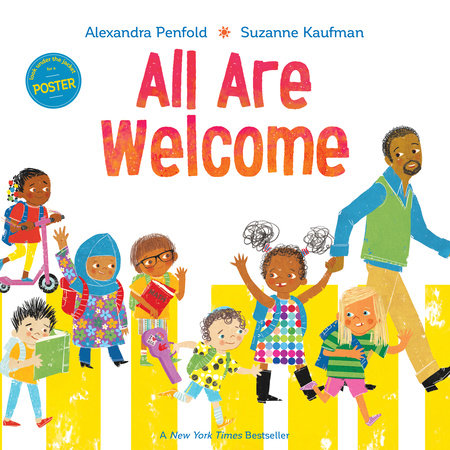One Test Doesn’t Tell the Whole Story: An Author’s Writing Journey
by Alexandra Penfold
Last month, while visiting my parents, I found a file of papers my mom saved from my childhood. There were programs from concerts and performances, drawings, letters, cards, stories, and report cards. I was touched that my mom had carefully saved these things. While leafing through, I found my fourth grade self-evaluation, which was mostly about how much I enjoyed school and loved reading and writing, and what I thought I needed to do to improve as a student in the next year. The kicker for me was I wrote a little bit about how I hoped to be an author someday. That made me smile because my sixth book, All Are Welcome, illustrated by Suzanne Kaufman, had been published a few days earlier. As an author, I am living what my 10-year-old self dreamed. Just writing that takes my breath away. I took a picture of the evaluation to use in school visits and presentations to remind students to follow their dreams.
As I continued flipping through the pile, I found my state test report from the same year, which showed I had scored far below the goal level for writing and was noted as “minimally proficient in writing.” The pronouncement was so blunt and dismissive, especially when juxtaposed with the hopes and dreams of 10-year-old me. There’s a lot to unpack there, and sharing my self-reflection paired with my score on social media has sparked plenty of conversation about what it all means.
This weekend I sorted through some papers my mom saved from my childhood. The top one is my 4th grade self evaluation. The bottom, my 4th grade state test score. Random House published my 6th book last week. #MoreThanATest pic.twitter.com/kzHFId258x
— Alexandra Penfold (@AgentPenfold) July 16, 2018
Here’s what it means to me: Standardized test scores are just one point of data, not the full picture. And they can’t capture drive, grit, and ambition. Tests can’t measure the support of parents who believe in you and will fight for opportunities for you when you’re too little to fight for yourself. Tests can’t measure the value of a teacher who helps you believe in yourself.
As a kid, I loved reading and writing. I was fortunate to attend a wonderful public elementary school with an integrated day program that was focused on project-based learning. I LOVED my elementary school because we got to read what we wanted, write what we wanted, and study what we wanted. Our teachers saw the potential in every child. I remember in fifth grade, our teachers put together a Rising Writers Literary Journal, and every student in fourth and fifth grade contributed. Some kids wrote funny stories and others wrote poems or more serious stories. Some were long and some were short. At the end, everyone celebrated when our work was published. Moments like that helped me believe I could write. Moments like that helped me believe I was a writer.
I don’t have the sample of writing that was graded for the test, just the score report. And I don’t doubt that whatever I wrote during the test period showed minimal proficiency based on their grading rubric. If you look critically at my self-evaluation, it’s missing a colon after the initial “Writing,” and with my newly acquired cursive skills, I missed a letter in “author.” Oops! I never said that I was a brilliant writer in fourth grade, just that I loved writing and hoped to be an author someday. With the help of supportive teachers and an incredible mother, I steadily improved my writing over time. I could point to later test scores where I aced the writing essay portions and other academic accolades, but the entire point is one test doesn’t tell the whole story.
In an ideal world, test scores would give teachers information about their students’ strengths and weaknesses to enable them to support their learning. Too often test scores are used as the only metric to label students and confine them to leveled tracks rather than recognize their potential. For the students who are struggling and need encouragement, I wanted to share my mediocrity to show that what you do in one hour on one day isn’t predictive of what you can achieve in a lifetime, and often you will fail and fail and fail again before you succeed.
For parents who say, “My child is so much more than this test score,” I want them to know that they are right. It’s heartening to see all the teachers and parents out there who are shaping young minds and directing them toward a growth mindset. Thank you for the work you do; it means more than you’ll ever know.
-
By the Author:

